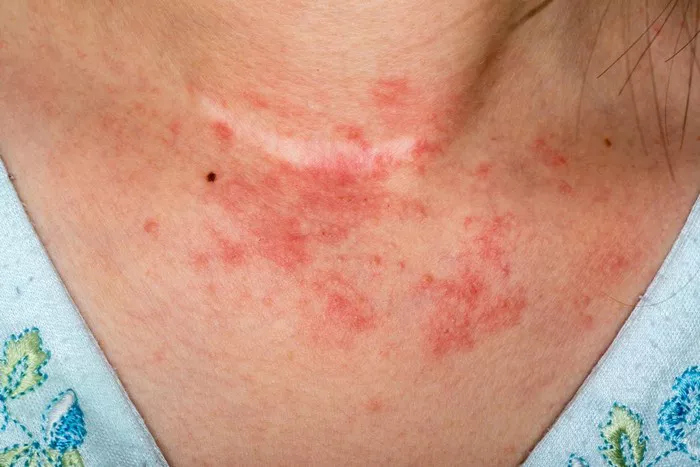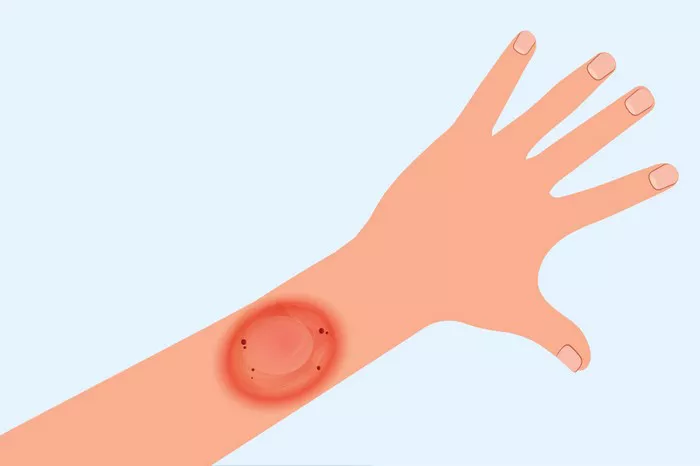Hives, also known as urticaria, are a common skin condition characterized by the sudden appearance of raised, red, itchy welts on the skin. These welts can vary in size from small spots to large patches, sometimes merging to form even larger areas of affected skin. Hives can appear anywhere on the body and can last from a few minutes to several hours, with some cases persisting for weeks or even longer.
The Role of Histamine in Hives
1. Histamine: The Culprit Behind the Itch
At the core of hives is the release of histamine and other chemicals from mast cells in the skin. Histamine is a powerful mediator involved in inflammatory responses and is the main substance responsible for the itching and swelling associated with hives. When histamine is released, it causes blood vessels in the skin to widen and become more permeable, leading to fluid leakage into surrounding tissues and the formation of welts.
2. Triggers for Histamine Release
Histamine release can be triggered by a variety of factors, ranging from allergic reactions to physical stimuli. Understanding these triggers is crucial for managing and preventing hives.
Common Causes of Hives
1. Allergic Reactions
Food Allergies
Food allergies are a frequent cause of hives. Common allergens include nuts, shellfish, eggs, milk, and certain fruits. When a person with a food allergy consumes the offending food, their immune system overreacts, releasing histamine and other chemicals that cause hives and other symptoms such as swelling and difficulty breathing.
Drug Allergies
Certain medications can trigger hives as an allergic reaction. Common culprits include antibiotics like penicillin, nonsteroidal anti-inflammatory drugs (NSAIDs) such as aspirin and ibuprofen, and medications used to treat high blood pressure. In some cases, hives may occur immediately after taking the drug, while in others, they may develop after a few hours or days.
Insect Stings and Bites
Insect stings and bites can cause localized hives at the site of the sting or bite. In some individuals, especially those with severe allergies, the reaction can be more widespread, leading to generalized hives and potentially life-threatening anaphylaxis.
2. Infections
Various infections, both viral and bacterial, can cause hives. Common viral infections that may lead to hives include the common cold, mononucleosis, and hepatitis. Bacterial infections such as strep throat can also trigger hives. The exact mechanism is not always clear, but it is believed that the body’s immune response to the infection plays a role in the development of hives.
3. Physical Triggers
Dermatographism
Dermatographism, also known as “skin writing,” is a condition where hives form in response to scratching, pressure, or other physical irritation of the skin. It is one of the most common forms of physical urticaria. In dermatographism, hives appear in the shape of the applied pressure and usually resolve within 30 minutes to a few hours.
Temperature Extremes
Exposure to extreme temperatures can also trigger hives. Cold urticaria occurs when the skin is exposed to cold temperatures, leading to the development of hives. Similarly, cholinergic urticaria is triggered by an increase in body temperature due to exercise, hot showers, or emotional stress.
Sunlight
Solar urticaria is a rare form of hives caused by exposure to sunlight. Individuals with this condition develop hives on areas of skin exposed to the sun, usually within minutes of exposure.
4. Chronic Conditions
Chronic Urticaria
Chronic urticaria is defined as hives that persist for six weeks or longer. The cause of chronic urticaria is often difficult to determine and may involve a combination of factors, including autoimmune disorders, chronic infections, and hormonal imbalances. In many cases, no specific cause is identified, leading to a diagnosis of idiopathic chronic urticaria.
Autoimmune Diseases
Autoimmune diseases such as lupus, thyroid disease, and rheumatoid arthritis can be associated with chronic hives. In these conditions, the immune system mistakenly attacks the body’s own tissues, leading to inflammation and the release of histamine.
Diagnosis of Hives
1. Medical History and Physical Examination
Diagnosing the cause of hives begins with a thorough medical history and physical examination. The doctor will ask about the onset, duration, and frequency of the hives, as well as any associated symptoms. Information about recent infections, new medications, and potential allergens will also be gathered.
2. Allergy Testing
If an allergic trigger is suspected, allergy testing may be conducted. Skin prick tests or blood tests (such as the radioallergosorbent test, or RAST) can help identify specific allergens responsible for the hives.
3. Blood Tests
Blood tests can help identify underlying conditions that may be contributing to chronic hives. Tests to check for thyroid function, autoimmune markers, and signs of infection are commonly performed.
4. Skin Biopsy
In rare cases, a skin biopsy may be necessary to rule out other skin conditions that can mimic hives, such as urticarial vasculitis. During a skin biopsy, a small sample of affected skin is removed and examined under a microscope.
Treatment of Hives
1. Antihistamines
Antihistamines are the mainstay of treatment for hives. They work by blocking the effects of histamine, thereby reducing itching and swelling. Common over-the-counter antihistamines include diphenhydramine (Benadryl) and loratadine (Claritin). For chronic hives, newer, non-sedating antihistamines such as cetirizine (Zyrtec) and fexofenadine (Allegra) are often preferred.
2. Corticosteroids
For severe or persistent hives, corticosteroids may be prescribed. These medications help reduce inflammation and suppress the immune response. Oral corticosteroids, such as prednisone, are usually prescribed for short-term use due to potential side effects. Topical corticosteroids may also be used to alleviate itching and inflammation.
Other Medications
In cases where hives are not responsive to antihistamines and corticosteroids, other medications may be considered. These include:
1. Leukotriene Receptor Antagonists: Medications such as montelukast (Singulair) can help reduce inflammation and are sometimes used in combination with antihistamines for chronic hives.
2. Immunosuppressants: Drugs such as cyclosporine or omalizumab (Xolair) may be used for severe chronic urticaria that does not respond to other treatments. These medications help suppress the immune system and reduce the frequency and severity of hives.
3. H2 Blockers: Medications like ranitidine (Zantac) can block a different type of histamine receptor and are sometimes used in combination with H1 antihistamines for more effective relief.
Lifestyle Modifications
In addition to medication, certain lifestyle modifications can help manage and prevent hives:
1. Avoiding Known Triggers: Identifying and avoiding triggers such as certain foods, medications, and environmental factors is crucial for preventing hives.
2. Stress Management: Stress can exacerbate hives, so techniques such as mindfulness, meditation, and yoga can be beneficial.
3. Skin Care: Gentle skin care practices, including using mild soaps and moisturizers, can help prevent skin irritation that may trigger hives.
Prevention of Hives
1. Allergy Management
For individuals with known allergies, managing exposure to allergens is key to preventing hives. This may involve dietary modifications, avoiding certain medications, and taking preventive antihistamines during allergy season.
2. Infection Control
Preventing infections through good hygiene practices, such as frequent handwashing and staying up-to-date with vaccinations, can help reduce the risk of infection-related hives.
3. Environmental Control
For those with physical urticarias, controlling the environment to avoid temperature extremes, wearing protective clothing, and using sunscreen can help prevent hives.
When to See a Doctor
While most cases of hives are mild and self-limiting, it is important to seek medical attention if hives are accompanied by symptoms such as difficulty breathing, swelling of the face or throat, or a rapid heartbeat, as these may be signs of a severe allergic reaction called anaphylaxis. Additionally, individuals with chronic or recurrent hives should consult a healthcare provider to determine the underlying cause and appropriate treatment.
Conclusion
Hives are a common and often frustrating condition that can significantly impact quality of life. Understanding the various causes of hives, from allergic reactions to chronic conditions, is essential for effective management and prevention. Through a combination of medical treatment and lifestyle modifications, most individuals can achieve relief from the itching and discomfort of hives. If you experience hives that are persistent, severe, or accompanied by other concerning symptoms, it is important to seek medical advice to ensure appropriate care and to rule out any serious underlying conditions.
Related Topics:

























